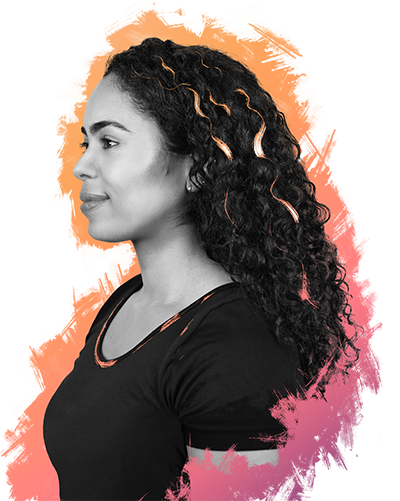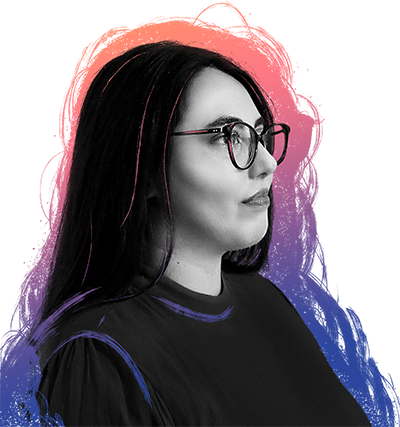Profiles in student leadership
As student leaders, Olivia Ghosh-Swaby and Khalidha Nasiri are changing the lives and experiences of people in their home and school communities
By Jennifer Párraga, BA’93
 Standing on the stage at Middlebury Public School, Olivia Ghosh-Swaby proudly recited the school’s values of communication, cooperation and courtesy. With the school’s dolphin mascot cheering in the background, Ghosh-Swaby officially began her leadership journey as a school ambassador.
Standing on the stage at Middlebury Public School, Olivia Ghosh-Swaby proudly recited the school’s values of communication, cooperation and courtesy. With the school’s dolphin mascot cheering in the background, Ghosh-Swaby officially began her leadership journey as a school ambassador.
It was a pivotal moment.
“That was when I realized I loved learning and wanted to learn more,” she said.
Today, Ghosh-Swaby is a Vanier Scholar, nationally recognized for her leadership skills and scholarly achievement, beginning the third year of her PhD training. She is a varsity athlete and an advocate for equity, diversity and inclusion.
She is a strong leader – who remains grateful for the mentorship she has received since those days as an elementary school student.
A self-described competitive kid, Ghosh-Swaby says that she always loved sports.
“I was that kid – the one organizing people to play games and sports,” she said. “And I always wanted to compete with the boys and be the best.”
While volleyball was her favourite sport in grade school, Ghosh-Swaby says she played everything at some point. Her hard work and skill were often rewarded, including being named athlete of the year for her grade school.
At around the same time, her teachers began to recognize her academic potential and encouraged her to work hard. It was all the encouragement the young student needed.
As Ghosh-Swaby began considering her academic future and continued to grow as a student leader, she was also learning about a rare neurological disorder called smooth brain syndrome. Her niece was born with the genetic disorder and Ghosh-Swaby joined her family to learn everything they could about the disorder.
Sadly, her niece died a few years later.
“It was really emotional for me,” said a tearful Ghosh-Swaby. “But it motivated me and I kept pushing to do more with my life.”
After graduating from high school as the valedictorian, Ghosh-Swaby came to Western University as part of the Scholar’s Elective Program. The program is offered to approximately 50 students annually and is designed to provide a unique educational experience for high-achieving students.
During her undergraduate studies, she had the opportunity to learn from and work alongside academic leaders such as Nicole Campbell, PhD, Tim Bussey, PhD, and Lisa Saksida, PhD, at Western and Dr. Jacob Udell at Women’s College Research Institute. The nurturing environments provided her with the tools she needed to grow academically and expand her research interests. It also was a time period defined by many firsts including having her first research published and understanding the complexities of setting up a lab from the ground up.
Ghosh-Swaby continued to excel in sports. A junior varsity volleyball player, she soon found herself assisting with coaching. And when her love of football pulled her onto the field, she joined a group of strong young women to develop a women’s football program. She also started to capitalize on the characteristics that she believes define a leader: compassion, listening, and reflecting and practising what you preach.
For Ghosh-Swaby football is more than just a sport.
“It combines strategic thinking and team building,” she said. “Coming into university, the game gave me that space where I could have a release and spend time with a great group of women who have become family. And it’s where I felt comfortable in a leadership role.”
Traditionally considered a male sport, Ghosh-Swaby is trying to create greater equity and working to grow women’s flag-football into an official, recognized varsity sport across Ontario and Canada.
“Women have had to create their own opportunities for competitive-level football in Ontario and I’ve been fortunate enough to lead this movement.”
This past year, Ghosh-Swaby has also distinguished herself as one of a handful of student leaders who are driving progress on equity, diversity and inclusion at the School. She participated in planning the School’s antiracism symposium and in collaboration with her peers, she established the Council on Reforming EDI for Trainees (CREDIT), a trainee-led initiative representing more than 10 departments at the School with a goal to drive change at the leadership level.
Ghosh-Swaby’s love of learning keeps her focused on the future and her own growth. And while she’s proud of her own development as an adaptable and approachable leader, she continues to seek more coaching and mentorship opportunities in sport and academia.
“Mentorship and coaching offer an opportunity to develop the skills and growth of individuals,” she said. “I want to be more deliberate with this and especially support those who come from underrepresented and low socioeconomic status backgrounds.”
 Khalidha Nasiri’s story begins in Scarborough, Ontario. Rooted in her parent’s homeland of Afghanistan, it has been inspired and influenced by their journey and the lives of refugees who find new homes in Canada.
Khalidha Nasiri’s story begins in Scarborough, Ontario. Rooted in her parent’s homeland of Afghanistan, it has been inspired and influenced by their journey and the lives of refugees who find new homes in Canada.
A third-year medical student who is navigating her way through the joys and challenges of her studies, Nasiri is also the founder and executive director of the Afghan Youth Engagement and Development Initiative (AYEDI).
She created the grass-roots organization in 2018 and today it is a registered and federally funded not-for-profit with social, mentorship and advocacy programs centred on Afghan Canadian youth.
“Scarborough has many communities who face socioeconomic barriers, and growing up I was very familiar with the challenges that people face. And while there were some great programs and resources out there to assist people, I couldn’t help but wonder if some of the programs would be more effective if they were led and coordinated by those with lived experience,” Nasiri said.
While pursuing her master’s studies in epidemiology, Nasiri began to do the research to build a team and create the initiative – all with an eye to improving long-term life outcomes for underserviced youth and to building a healthier community.
A mentorship program was a top priority right out of the gate. Nasiri’s hope was to match at least 15 youth (aged 15 to 21 years) with 15 older Afghans and facilitate the development of life and leadership skills.
With the first mentorship program wrapped up, Nasiri can’t help but feel she is on the right path. “When you hear from people who were part of the program that it changed their life, I feel a lot of pride. The mentorship program is really the thing I’m most proud of.”
The longer Nasiri managed AYEDI, the more she began to think about defining her leadership style and what it means to be a leader.
“I knew that the traditional definition of being a leader meant being a manager and a gatekeeper of the organization’s mission, as well as keeping the team focused,” she said. “But I wanted to be a leader in the truest sense of the word, which for me means that I had to help others grow. I had to build trust, to listen, to understand and to learn, be a coach and motivate them, support them in their own professional development journeys, know when to stand up and speak out, and in the end, translate our vision into reality and inspire others.”
Putting these skills to work, Nasiri has been able to create additional projects, such as voter outreach initiatives aimed at the Afghan community and host the Afghan-Canadian Youth Community Impact Conference.
More recently, AYEDI created the Afghan Community Impact Incubator, which provides training and funding to youth who are leading grassroots projects to improve the health and wellbeing of Afghan community members. Partnered with the Government of Canada’s #RisingYouth Grants Funding Program, Nasiri says the Incubator was able to fund $30,000 for 20 projects that impacted 5,000 youth and generated more than 1,000 volunteer hours.
Recently, Nasiri applied some of her experience from AYEDI to create a formal mentorship and educational project for prospective medical students from underrepresented communities. With a grant from the Canadian Federation of Medical Students, she is focused on increasing diversity in future medical school cohorts.
Nasiri’s own path to medical school included a rejection with her first application, that redirected her to graduate training, an internship with the World Health Organization, and unexpected opportunities for personal and professional growth. She hopes that her story can inspire others and that they can see themselves in a place that she now feels a great sense of community.
Meanwhile, as a medical student and leader, Nasiri says she is still trying to figure out how to achieve and maintain balance.
“When you are passionate about something, it can push you to new heights, but it can also tip your balance,” she said. “While I have learned to pace myself, I’m still developing my skills, trying to learn more, and constantly evolving to become a better leader for my patients and community.”








